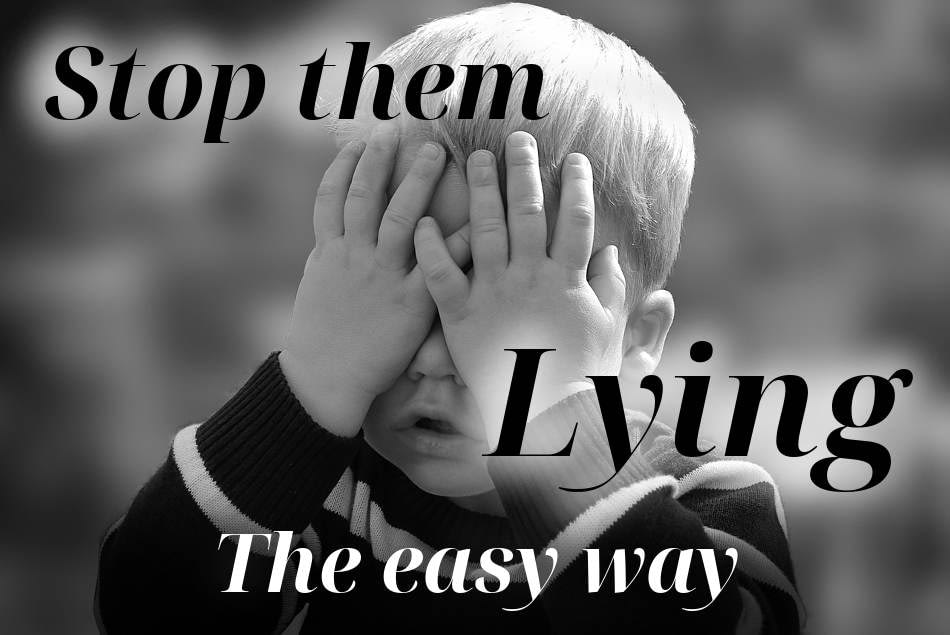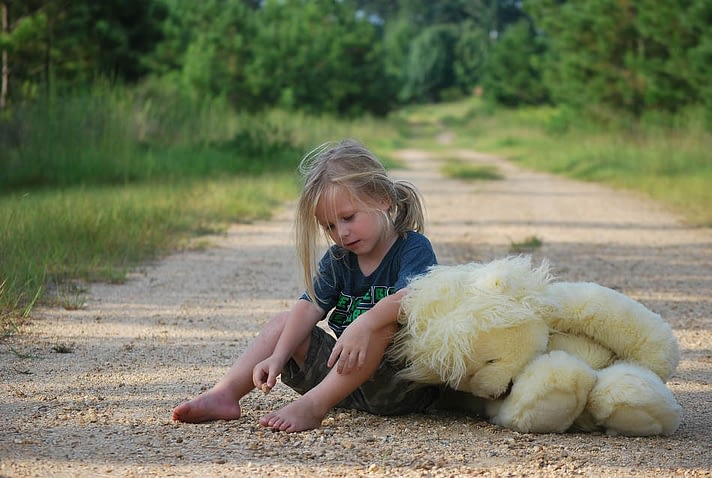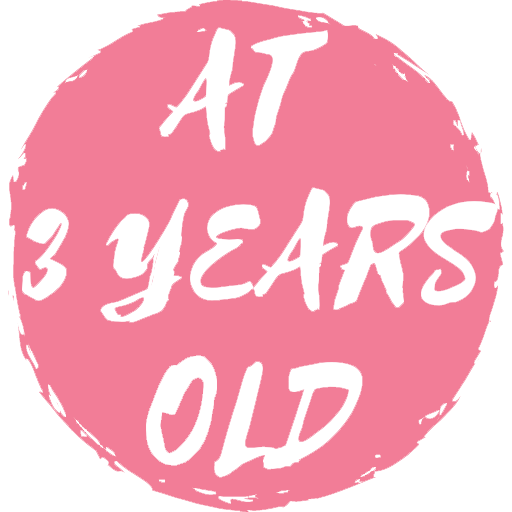11 Simple Ways to Help Your 3 Year Old Stop Lying

“The first occasion of your child telling a lie is not an occasion to be alarmed but an occasion for celebration”
― Dr Kang Lee, Wall Street Journal.
A mound of toilet paper was piled up in the bathroom. “Did you do this?” I could hear the annoyance building up in my friend’s voice. His 3 year old son was now staring into space.
It seemed to me like the idea for the perfect explanation was starting to form in the boy’s head. The boy shouted out, “A naughty monkey did it! He jumped up like this!”. The boy’s hands were held up in the air as he jumped up and down. My friend looked at me and sighed.
A 3 year old’s relationship with the truth isn’t quite as good as you would like it to be, Gasp! At this age, their imaginations are enormous. Floors filled with lava, pirate ships made from cardboard boxes and castles made from cushions, (the last one a favorite in our house). A dazzling imagination is normal at this age. Your 3 year old’s newly found talent for lying might alarm you. But don’t worry, lying is not only normal. It is a sign of your child reaching the next stage of healthy brain development.
Not convinced? I’ll show you why.
WHY YOU SHOULD CELEBRATE YOUR TODDLER’S FIRST LIE
It is against your instincts as a parent. You want to teach them wrong from right and help them to grow up happy. You also don’t want them to get into trouble for lying. When they lie in front of you that’s one thing.
You can try and correct them and teach them why it’s wrong. When they lie in front of others and strangers, that gets embarrassing. It feels like their lies reflect on your ability as a parent. People will think that you aren’t teaching them to value honesty and the truth.
That is not the case. All children at this age begin to develop their social skills. It’s part of the normal development of their brain to explore lying.
That’s why you should be celebrating their first lie. It is done in an innocence that we struggle to understand and it shows their newfound understanding of the thoughts and feelings of the people around them.
You don’t want to encourage lying of course. You can help to reduce the amount that they lie and try to stop it altogether for serious lies in the future, but sit back and cherish that first lie. They are growing up.
IF YOU ARE WORRIED ABOUT YOUR TODDLERS LIES
Look at your 3 year old’s relationships with the important people around them. If you think those relationships are generally good then you shouldn’t worry about their new love of little white lies. If their social relationships are poor then it might be time to seek professional advice.
11 SIMPLE WAYS TO HELP YOUR TODDLER GROW OUT OF LYING

1. REALITY VS FANTASY
The most important conversation to have with yourtoddler when they start to discover lying is about the difference between fantasy and reality. It’s hard for you to understand the difficulty that a child may have in remembering what is real and what is fantasy. It is important to talk about the differences. It may not fully sink in now, but it is important for you to start early and lay the foundation now.
A great opportunity to help them practice knowing fantasy VS reality is pretend play. For example, if your toddler sees a character on the TV, then you could tell them “The man on the TV is an actor, so that means he pretends to be a police officer, we could pretend to be police officers if you would like?”. While pretending to be a character your 3 year old should start to realize the differences between fantasy and reality.
If your child has an imaginary friend you can point out all the things that your child can do, that their imaginary friends can’t. Your child can eat their dinner, they can talk to friends, they can hug and kiss mummy and daddy. Imaginary friends can’t do any of those things.
2. USE STORIES ABOUT MORALS
Stories are powerful and have an amazing way of influencing the way your child acts. Toddlers will pay attention to the morals in stories. They won’t always pay the same amount of attention to you, even if you try and teach them the same lesson. There are plenty of different stories that will teach your 3 year old that lying is wrong and can get them into trouble.
My favorite story to teach your 3 year old about lying and the one I think you should use is the classic “The boy who cried wolf”. I love to read the book to my toddlers which you can check out here. (I just love the artwork in that book and I think they enjoy it even more than I do). You can also listen to the story being read on YouTube.
The story of the boy who cried wolf is an excellent way to get them to realize on their own that lies can get them into trouble.
The story makes it clear that if you tell a small harmless lie. That small lie can grow into a bigger problem that could end up being far worse.
3. MAKE HONESTY IMPORTANT
Toddlers take in and copy from us more than we realize. They are constantly learning, from when they wake up to when they go to bed. Studying you and the rest of your family to see how you deal and cope with everyday problems and issues. When a child sees you tell a lie, they may decide to take that behavior as a lesson. When they see their older brother or sister lie about stealing a cookie, they might decide that they will try that in the future. If it was successful.
Make a point in your family to always be honest with each other. You might have to take a look at some of those seemingly innocent lies being told in front of your 3 year old. Try and have an air of openness in your family. If somebody has a problem or an issue that they feel bad about, make sure they feel they can come to you and talk about it. Trust is important in family life.
Your toddler will grow up in a house full of love and trust and be much less likely to need to lie.
4. BECOME A ROLE MODEL FOR YOUR TODDLER
You may want to look at the little “white” lies you tell every day. It’s a social skill important in life that we all tell little white lies. We obviously can go around telling everyone we meet the absolute truth, it may hurt their feelings or get us into trouble. What you can do is try to be as honest as possible in your home and with your family.
Try to make a point of it. Try to let go of always being right in front of your children. I try to own up to mistakes and say sorry when I think it’s the right thing to do. Children are great at looking to you and copying everything. We all think of ourselves acting differently than we actually do in real life. It might be time to see if your actions match what you are telling your children to do.
Become a role model for the rest of your family, be strict with yourself on honesty. This will inspire them to follow in your path and they will hopefully start to pick up on your improvements and want to be just like you.
5. GIVE THEM THE BENEFIT OF THE DOUBT
An important way to promote trust in your family is to give them the benefit of the doubt when it’s not clear that they have lied. I know it is not the usual way of dealing with a child when you can be almost sure that they have lied. You will find situations where you just can’t prove what they are saying is true or not.
In these situations give them the benefit of the doubt and trust them.
There will be plenty of other opportunities to teach them about how bad lying is. You will have times when you know for definite that your child is lying. That is the time to have that discussion with them and try and help them to see their error. If you try to punish them for something that you may think is a lie but is actually true, this will have a seriously negative effect on their trust with you.
This could lead to them lying more frequently. Making the problem worse
The opportunity to teach them about lying will come along, don’t feel that you need to tell them off every time they do.
6. TRY NOT TO GET ANGRY
If you are sure that your 3 year old has told a lie. Make sure to stop, keep calm and try to think about how you will approach the situation. It’s too easy to get angry, feel hurt and betrayed and wonder where they are learning this bad behaviour from. Remember that it’s a normal part of growing up and nothing to be ashamed of. With your help, they will grow out of it.
They will also learn the important lesson of honesty which will last them for the rest of their lives.
Plan your response beforehand. Don’t wait until the moment that you have discovered their lie to decide what to do about it. That will lead you to make a poor decision. If you decide before on how to handle the situation, you will be calm when it does happen. Your 3 year old will pick up on your calmness. You want to deal with everything smoothly. Keep calm, don’t get angry and stay in control of the situation.

7. GIVE THEM CHANCE TO RECONSIDER
This tip is game-changing. I use it all the time. When you discover their lie, take them to one side, talk to them calmly and ask them the following types of questions. (for example):
- “Would you like to think about what you said again?”
- “Sometimes we can get mixed up, it’s ok, are you sure that what you said happened?
- “It’s ok that you have remembered that slightly wrong, so what actually happened?”
The key point to remember is that I am not accusing them of lying. I am reassuring them, then asking them to reconsider if they would like to tell me the lie again. I have found that many times, they will change their story and drop the lie when they reconsider.
This method avoids the label of liar and any nasty situations where feelings can easily get hurt.
8. LIMIT THEIR OPPORTUNITY TO LIE
I know that sometimes I find myself trying to catch them in the act of lying so I can make a point out of correcting their behavior. I now know that this is the wrong way. If you do this too. Have a think, if you have ever asked a question like:
“So did you draw on the wall in the nursey?”
Asking a question like the one above gives your child the opportunity to lie. You don’t want to turn the situation into an intensely dramatic one where they confess and own up. Most 3 year old’s will find situations like that stressful and the temptation to lie will be strong. We want to help them learn to make the right choice not stress them out. The lie helps them escape this stressful situation for a moment.
A better way you could try to deal with a situation like the one above is by saying:
“So you have drawn on the wall in the nursery, that’s not acceptable, let’s both go and see if we can clean it off together”
An answer like this lets them know that what they did was wrong but it also reassures them that you will help to try and put it right. It doesn’t dangle the temptation to lie in front of them. It gives them a way to make up for the mistake they made and hopefully to learn from it.
9. BRAGGING
If the lies that your 3 year old are telling center around bragging (exaggerating for attention). It can be frustrating. It’s a common problem. How many of us can remember stories of kids at school who flew a plane over the weekend? Or who’s dad can fly? or who has a pet Tiger? It can be worrying for a parent when your child makes up stories like these.
When a child lies in this way it is because they crave positive attention. Maybe they are feeling that they are not getting enough or maybe they enjoy it and want more. The way to stop this kind of lying is simple.
Give them more positive attention for the things they do in life. This will mean they will seek it less from making up fantasy stories. Bragging can be a way that your child tries to build their self esteem. If they are praised for the good things that they already do, they won’t feel the need to boost their self esteem from bragging.
10. NEVER LABEL YOUR CHILD AS A LIAR
It can be an easy mistake to make. If they have told a lie, then they are a liar. The problem is that, as a 3 year old, they may take this label to heart more than an adult would. It’s important to teach your children that people are many different things in life and that decisions we make shape who we are. It is important to remember that making a mistake is part of learning and doesn’t make us a bad person.
11. EMPHASIZE THE POSITIVES OF TELLING THE TRUTH
Put the emphasis on telling the truth being & good, not that lying is bad. Seems simple, but by thinking about it that way, you will be more effective in getting your child to outgrow their lies. We want to encourage the positive parts of their personality, reassure them that they are good.
We don’t want to constantly remind them about negative experiences they’ve had and mistakes they’ve made. This will hurt their self esteem. Build up their self esteem with positive reinforcement and watch their emerging character get stronger. You will be proud of the adult they become.

LYING AT AN EARLY AGE MIGHT MEAN YOUR TODDLER IS GIFTED
A study by Dr K Lee says that lying in 3 year olds is part of their normal social development. It says that learning to lie is an important developmental milestone. It shows that your child has reached the next stage of their journey into developing their social skills. If a child starts to lie at 2 years old for example. This would be earlier than normal.
A child’s ability to lie is closely related to their intelligence in a positive way. The earlier a child lies, the more intelligent they tend to be. Gifted children lie earlier than their friends.
The ability to lie convincingly is a difficult thing for a toddler to do. It takes social awareness and intelligence. Your child has to understand what someone else might be thinking. Others thoughts and feelings are a complex subject to a child at that age.
Toddlers who lie earlier than their friends tend to have a better time making friends in the playground, they can understand others thoughts and feelings better than other children.
WHY WOULD MY CHILD LIE TO ME?
Please don’t take your child’s lies personally. It’s not an indication that they are going to be naughtier than any other child. It is a completely normal part of growing up.
Toddlers can lie for any number of reasons, some of them might surprise you. I think it is important to understand these reasons. If you do, then I think you will be more understanding of your child when you do catch them lying.
4 REASONS WHY YOUR TODDLER MIGHT LIE
1. THEY MIGHT BE LYING TO STAY GOOD
When you ask any child if they are “good” they always reply “yes”. That is how they see themselves, they try their best. Growing up is hard and confusing. When they do something that they regret, they may lie to try and stay “good” in your eyes. Make sure to reassure them that everyone makes mistakes. It’s how we deal with them that is important.
2. THEY MIGHT WANT TO AVOID DISCIPLINE
If discipline is harsh in your family for lying then they may lie just to try and avoid it. Make sure that any punishment is matched to how serious the lie was. At 3 years old they don’t always fully understand why they are being punished, so make it clear why they are being punished and how they can act in the future to stop it happening again.
3. THEY ARE STRUGGLING TO GRASP REALITY VS FANTASY
At 3 years old, children’s imagination can be so strong that they can sometimes wish something so hard that it becomes true to them. They might regret making a mess for example, so they wish hard that they didn’t do it. They then might struggle to tell the difference if they made the mess or not.
4. THEIR MEMORY ISN’T PERFECT
Toddler’s memories aren’t perfect. If they got into a fight with a sibling, for example, they might forget who hit who first in the heat of an argument. They might truly believe they are innocent even if you saw how it started. In those cases, it’s better to give the benefit of the doubt and wait for clearer cut incidents to make an example of their behavior and help them learn their lesson.
SUMMARY
As adults we like to think of ourselves as always telling the truth and being honest.
I know that when I decided to write down every little “white” lie I told in one day (12 in total!). It surprised me that I had told so many. In our everyday lives as adults I would argue that we need to tell some of these “white” lies. If someone asks you if their new haircut looks good, is there ever any circumstance where you would tell them no? At the risk of hurting their feelings? I know I wouldn’t.
Although we might think that lying is pretty black and white in terms of good and bad. I think I’ve made it clear in this article that it isn’t. It’s a complex subject that our little 3 year olds have to try and understand. I want you to be there for them and help them through this confusing time. And to become honest adults when they grow up.
If your child has started to lie a little earlier than their friends, I think it’s important that you should take the test to see if they show signs of being gifted or not. Lying could be an early indication!

Leave a Reply